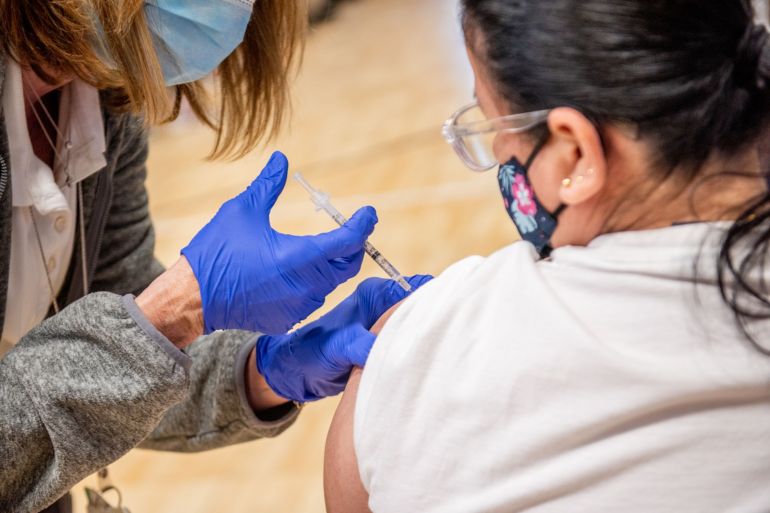Biden to send additional 20 million vaccine doses abroad
President Joe Biden will send an additional 20 million doses of US coronavirus vaccines abroad by the end of June – including, for the first time, shots approved for domestic use, sources tell Bloomberg News.

President Joe Biden plans to send an additional 20 million doses of U.S. coronavirus vaccines abroad by the end of June – including, for the first time, shots authorized for domestic use, where supply is beginning to outstrip demand.
Biden will announce Monday that he’ll export 20 million doses of vaccines from Pfizer Inc., Moderna Inc. or Johnson & Johnson, on top of 60 million AstraZeneca Plc doses he had already planned to give to other countries, according to a senior administration official familiar with the plan.
Keep reading
list of 4 itemsMexico’s teachers seek relief from pandemic-era spike in school robberies
‘A bad chapter’: Tracing the origins of Ecuador’s rise in gang violence
Why is the US economy so resilient?
The official, who asked not to be identified ahead of planned remarks from the president, stressed that the measures are only a first step as the U.S. pivots its attention to quelling the pandemic abroad. Biden has previously pledged that the U.S. would soon become an “arsenal” of global vaccine supply.
Biden will also announce that he is putting Jeff Zients, who has served as the White House coronavirus response coordinator, in charge of his effort to beat back the pandemic globally, the official said. Zients will work with the National Security Council and other agencies to steer doses abroad.
The announcement is a watershed moment in the pandemic and a pivot for Biden’s administration. The U.S. government, under two presidents, claimed nearly all of the first several hundred million doses of vaccines produced on its soil. That approach allowed Biden to advance what has been one of the most successful domestic vaccination efforts in the world, but fueled inequities between nations that can produce their own shots and those that can’t.
The Pfizer, Moderna and Johnson & Johnson vaccines are authorized for use in the U.S., but AstraZeneca’s shot is not. It wasn’t immediately clear which countries would receive U.S. shipments.
Mexico and Canada have already received doses of the U.S. AstraZeneca stockpile, and Pfizer has begun shipping doses of its U.S.-produced vaccine to countries including Mexico, Canada and Uruguay, apart from the Biden administration’s plans to share doses.
The U.S. domestic vaccination campaign is beginning to run out of willing arms. The country is set to cross a threshold of 60% of adults who’ve received at least one shot on Monday.
In Need of Shots
Meanwhile, scores of low-income nations and even some developed countries are struggling to secure supplies of vaccines.
Covax, a global program aimed at easing vaccine procurement and access for lower-income countries, is facing a supply shortage and expects the shortfall to reach about 190 million doses next month, UNICEF, one of its partners, said on Monday. Biden has previously announced a pledge of up to $4 billion for Covax.
Biden has said he would only share U.S.-purchased doses once there was enough supply to meet U.S. demand. Manufacturing errors at a Baltimore plant resulted in a contaminated batch of Johnson & Johnson’s shot and greatly slowed production of the vaccine, once envisioned as a pillar of U.S. supply. Instead, the U.S. has relied almost entirely on the Pfizer and Moderna shots.
Biden has faced pressure to do more to help the world, as the U.S. winds down nearly all mitigation measures such as masking and other countries try to quell fresh outbreaks and new variants with limited vaccine supply. Biden has launched what he calls a “new phase” of his pandemic effort, turning to the painstaking work of persuading more hesitant Americans to get shots as demand dries up among people eager for vaccination.
U.S. caseloads continue to fall, with 16,857 new cases recorded Sunday, the lowest daily total since March of 2020 — though Sundays are typically the lowest daily total of any week. The pace of vaccinations has fallen by over a third from a month ago, and is hovering now at about 2 million doses a day.
Vaccine exports have been a thorny issue for Biden, who has tried to reclaim a mantle of U.S. leadership abroad while also borrowing many of the America-first tendencies of his predecessor, Donald Trump, in his pandemic response. While the European Union and India mixed vaccine exports with domestic allocation, the U.S. has for months cornered the market on its supply, effectively preventing early exports.
Trump and Biden used wartime powers to prioritize their orders from U.S. plants, effectively placing the government at the front of the line. U.S. orders also include contractual clauses limiting the government’s ability to share doses abroad.
The administration sought to skirt those restrictions by framing the 4.2 million AstraZeneca doses already shipped to Mexico and Canada as a “loan.”
–With assistance from James Paton.